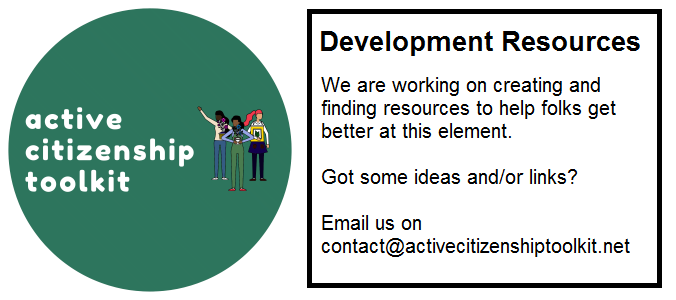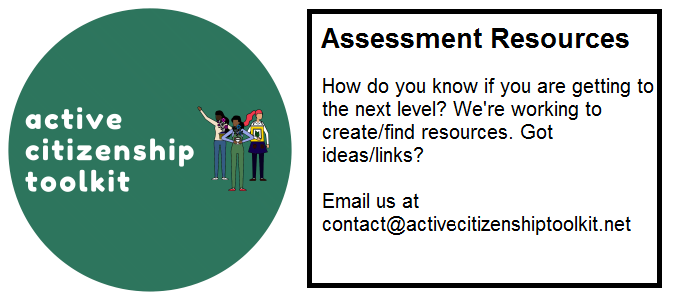Element Descriptor
In the honeymoon phase it’s all air kisses and ignoring of microaggressions. But as a group grows/ages/endures then tensions can grow. Left unacknowledged, unmanaged, the smallest things can become proxies and pretexts for vicious fights that come outta nowhere, especially if the political goals of the group remain unreached and more-distant. Failure to understand the causes, consequences and possible remedies of intra-group conflict will lead to tears before bedtime.
Level descriptors
| Novice | Practitioner | Expert | Ninja |
|---|---|---|---|
| You can acknowledge that your group has conflicts within it, and have a stab at… no, not other people, at understanding where they come from (personal, political, both) and come up with basic ways of managing the conflicts | You can spot simmering conflict even when everyone else is being super politet and is bright-siding and gaslighting you about it not existing. You can fathom the various reasons it’s going on, put yourself in various shoes, walk in them. You can devise and execute ways of defusing ticking time bombs | You can spot the tensions and overt/covert tensions between members of a seemingly cohesive group, and without derailing its stated goals, also create/carve out the time and emotional courage and skill to deal with issues which have been festering, whether the participants fully grok it or not. | People think you’re something between a telepath and a healer. You can get people in entrenched positions to see the other points of view, negotiate compromises and their enforcement mechanisms, without making enemies or wasting time from the Real Enemies Out There |
Element Overview Essay
This is a draft. If something doesn’t make sense, or you see typos, or if you have further ideas, please email us on contact@activecitizenshiptoolkit.net
So, once we’re in a group that seems to be functional that we enjoy, and maybe it’s the first one that we’ve encountered as part of active citizenship, and we credit it with changing our lives. We’re very, very reluctant to see cracks and splits and fissures. And we feel that if we see them, who name them, then that kind of creates them. And if we all just pretend that everything’s fine, everything will be fine. People don’t enunciate it in quite those terms, but there you have it.
There are also just people who are very afraid of conflicts because of the way that they were raised, their parenting style or previous experience of trying to deal with conflict. And you know, there’s that expression “let sleeping dogs lie.” But sleeping dogs do wake up and they do bite you. So it’s not always the right thing.
I’m not saying see every tiny conflict and then call an emergency group meeting over it, because some stuff just actually will resolve itself- it doesn’t matter.
So those are the causes of it and the group wants to present a united front and see itself as strong and united “unity through strength” etc. So lots of reasons why conflict within a group can be buried and sometimes there’s a good reasons and sometimes they can’t. Conflicts will resolve themselves. And other times they won’t see the consequences of not being able to see except understand in track group conflict is that sometimes it will blow off in the face. And you’ll be left demoralised, ill equipped. And you’ll spend a lot of time trying to resolve the conflict and maybe sometimes it has gotten too bad, you know, a stitch in time would have saved nine and now it’s even beyond nine and relationships break down. The group becomes demoralised, the group falls apart. The wider ecosystem within which that group sits is negatively affected because people had seen the group as functional and effective and “well if they can’t even keep themselves together. What chance have we got?” and it can have a ripple effect..
And this is why I was always quite critical of groups being set up and you going up like a rocket down like a stick, because I think that sends a signal number one, that that’s somehow acceptable. And number two, that it doesn’t account for the fact that people will get demoralised at a group level and second and third order effects people you’ve never met, can be negatively their morale can be negatively affected because they hear from a friend of a friend.
So what you can do about it? Well, as I said earlier, you don’t need to call emergency meetings, every time someone is pissed off with someone else. But you do need to think about what some of the obvious causes of conflict between group members are and it might just be resentment that someone thinks someone else is not taking things sufficiently seriously that therefore that they’re unreliable, that they’re trying to hog all the attention, that they’re making decisions without due process, that they’re trying to become a dictator, that they made a big mistake that has cost the group credibility or time to fix and that hasn’t been acknowledged and things haven’t been put in place to make that same mistake, less likely in future.
It may be just two people just don’t like each other, which I always think is, it’s fine.
Just because you’re all in an active citizenship group doesn’t mean you have to get along off, you know, off the court, as it were. I mean, famously, there were players in the Chicago Bulls in the 1990s, who literally would not speak to each other off the court. But on the court, of course, they would pass the ball to each other if they were in the best position because you’re a team and you’re trying to win a basketball game.
So, also, you have to remember that what seems like a trivial thing for some people will actually have a lot greater meaning for others, you know, it will trigger them, it will remind them of previous conflicts. So, it might be worse, you know, sitting down as a group and saying, here are the things in general, that pissed me off. When I’m within groups, you know, it might be punctuality, it might be swearing, it might be refusing to say “I’m sorry”, it might be taking the credit for other people’s work, whatever. You’ll also of course, always have situations where some people just have more time to devote than others. And they may not mind but the other people may think that they might
So I could go on and on. I think one of the things you can do, and it won’t work all the time, or even most of the time, is figure out within the group, what your triggers are for conflict, then of course, if conflicts do breakout, you need some kind of mediation process now that might be internal to the group.
Or you might ask someone from another group or a friend, who the people in the conflict regard as a fair dealer, to come in, and try and figure out ways of healing the initial conflict, and coming up with ways of stopping it being a big deal in the future. And, you know, you’ll also have to be grownups and accept that some conflicts will be ongoing, and need just to be managed.
And some conflicts are gonna get out of hand. And they’re gonna mean the end of the group and it’s not the end of the world. Climate change. That’s the end of the world.
Development Resources

Assessment Resources

